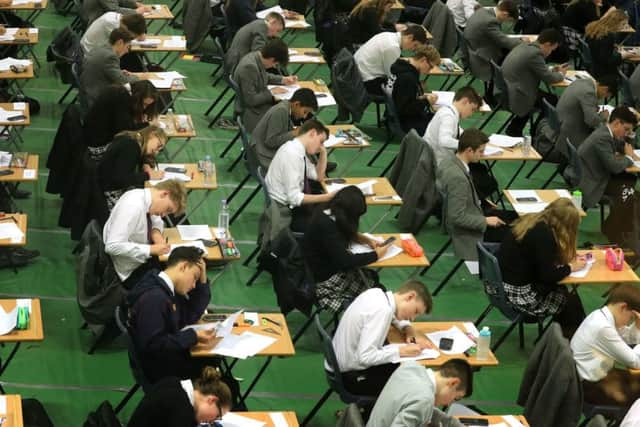Growing calls to allow all Scots pupils to take eight subjects in fourth year
Many schools only allow six National 4 and 5 exams at this stage – while others allow eight.
A new report by Reform Scotland, A Test of Fairness, says opportunities for pupils differ wildly depending on where they live.
Advertisement
Hide AdAdvertisement
Hide AdHolyrood’s education committee found earlier this year there had been a narrowing of the subject choices on offer for some pupils, prompting a government review of the senior phase of education.


Educationalist Keir Bloomer, the chairman of Reform Scotland’s Commission on School Reform, says today the overhaul of classroom teaching over the past decade, Curriculum for Excellence, was supposed to broaden education.
But he said: “It is becoming increasingly clear that its implementation is narrowing it.
“We are seeing a postcode lottery where pupils who are capable of successfully sitting eight exams are being prevented from so doing.
“This is narrowing their education and limiting their prospects as they move towards Highers and then to college or university.
“The Scottish Government must put an urgent stop to this by making it clear to all schools that pupils may sit eight exams.
He added: “They can do this temporarily until they get a grip on what is going on here, but do it they must, for we are in grave danger of minimising the potential of a generation of our young people.”
Research done by Reform Scotland found some state and independent schools have ignored the limit, allowing their pupils to take eight subjects – creating a “postcode lottery.”
Advertisement
Hide AdAdvertisement
Hide AdCurriculum for Excellence has come under repeated scrutiny since it was introduced, with Professor Jim Scott, of Dundee University, saying last month that the system was having a “negative effect” on pupils.
Prof Scott’s paper insisted that, had the Scottish Government known when the idea was mooted in 2006 about the issues it would cause, CfE would never have moved forward.
In 2014, as part of Curriculum for Excellence, the Standard Grade exams system was replaced with National 4 and 5s. Where Standard Grades were taught over S3 and S4, a two-year period, National 4 and 5s are supposedly studied in S4 only. The concept of Broad General Education (BGE), previously studied in S1 and S2, was extended up to the end of S3. However, this change to a single year of study has had a timetabling consequence. As a result, the majority of state schools now allow pupils to sit a maximum of only six National 4s and 5s, rather than eight.
But a Scottish Government spokesman said the number of courses on offer to pupils has increased. He added: “Young people can choose from a much broader range of pathways than before.
“This analysis takes no account of differences before and after the introduction of Curriculum for Excellence, which helps equip pupils with the knowledge, skills and attributes needed for life in the 21st century. It means pupils learn a wide range of subjects up to S3. Schools then have the freedom to design a set of courses, qualifications and awards between S4 and S6, tailored to meet young people’s needs.
“What matters is the qualifications that pupils leave school with and last year a record proportion went on to positive destinations including work, training or further study.”
Tory education spokeswoman Liz Smith said: “There are significant differences in the number of core subject choice options available across different schools, with the greatest narrowing of core subjects in many schools in the more deprived communities.
“This comes at a time when Scotland has been slipping back in the international league tables and when there are constraints in teacher numbers.”
Advertisement
Hide AdAdvertisement
Hide AdEducation secretary John Swinney ordered a full review of the senior phase of education in secondary schools in September after a critical report by MSPs on the education committee found concerns over subject choice in Scotland.